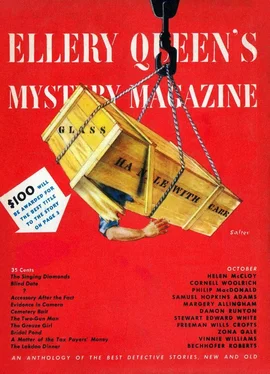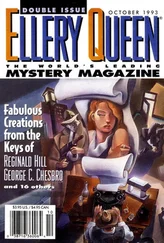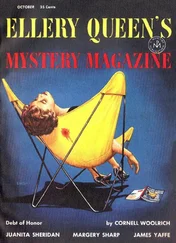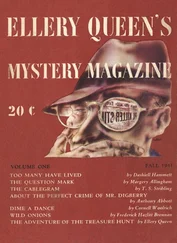Марджери Аллингем - Ellery Queen’s Mystery Magazine. Vol. 14, No. 71, October 1949
Здесь есть возможность читать онлайн «Марджери Аллингем - Ellery Queen’s Mystery Magazine. Vol. 14, No. 71, October 1949» весь текст электронной книги совершенно бесплатно (целиком полную версию без сокращений). В некоторых случаях можно слушать аудио, скачать через торрент в формате fb2 и присутствует краткое содержание. Город: New York, Год выпуска: 1949, Издательство: The American Mercury, Жанр: Классический детектив, на английском языке. Описание произведения, (предисловие) а так же отзывы посетителей доступны на портале библиотеки ЛибКат.
- Название:Ellery Queen’s Mystery Magazine. Vol. 14, No. 71, October 1949
- Автор:
- Издательство:The American Mercury
- Жанр:
- Год:1949
- Город:New York
- ISBN:нет данных
- Рейтинг книги:5 / 5. Голосов: 1
-
Избранное:Добавить в избранное
- Отзывы:
-
Ваша оценка:
- 100
- 1
- 2
- 3
- 4
- 5
Ellery Queen’s Mystery Magazine. Vol. 14, No. 71, October 1949: краткое содержание, описание и аннотация
Предлагаем к чтению аннотацию, описание, краткое содержание или предисловие (зависит от того, что написал сам автор книги «Ellery Queen’s Mystery Magazine. Vol. 14, No. 71, October 1949»). Если вы не нашли необходимую информацию о книге — напишите в комментариях, мы постараемся отыскать её.
Ellery Queen’s Mystery Magazine. Vol. 14, No. 71, October 1949 — читать онлайн бесплатно полную книгу (весь текст) целиком
Ниже представлен текст книги, разбитый по страницам. Система сохранения места последней прочитанной страницы, позволяет с удобством читать онлайн бесплатно книгу «Ellery Queen’s Mystery Magazine. Vol. 14, No. 71, October 1949», без необходимости каждый раз заново искать на чём Вы остановились. Поставьте закладку, и сможете в любой момент перейти на страницу, на которой закончили чтение.
Интервал:
Закладка:
Bingo seemed thoughtful. “Tell me,” he asked, “how soon before a race does a guy have to mail his bet?”
“Letters,” said Deborah, “have to be postmarked the day before. Of course, telegrams and phone-calls—”
“They don’t matter,” said Bingo, and relapsed into deep scowling reverie.
“What’s all the cerebration, my Angel?” asked Deborah fondly.
“I was just thinking,” said Bingo slowly, “that it might be nice to make your old man’s business put up that ten thousand...
“Without him knowing,” added Bingo to himself. “Or you either, if it comes to that...”
It was three weeks later that a record crowd of race-goers on Epsom Downs saw the fabulous French outsider, Pisan-Thibeau, win the Derby at the astonishing price of a hundred-and-fifty to one.
It was a great day for most bookmakers — and Mr. Delaney was jubilant. Out of all his thousands of clients, only one — a newcomer by the odd name of Sam Smiles — had bet on the winner, and although Mr. Smiles had to be sent a very comfortable-sized check, this was a drop in the bucket compared to the total intake.
It was a week later, when Mr. Delaney had already forgotten the race, that he was told one morning by his secretary that an American gentleman, a Mr. Huntoon, was demanding audience.
“Oh, well, show ’im in,” said Mr. Delaney — and, two minutes later, was regarding with astonishment a bank-statement which testified that there stood to Mr. Huntoon’s credit the sum of ten thousand, five hundred and seventy-two pounds, seven shillings and twopence.
Bingo grinned at Mr. Delaney. “I just went out,” he said, “and used my so-called brains...”
And he wouldn’t say more than that to anyone. Not even to Deborah — until she’d been Mrs. Howard Huntoon for more than forty-eight hours.
And then Bingo said, “Well, here it is, Deb! Remember Sam Smiles, the guy who collected that big bet off your old man?” He tapped his chest. “Alias Howard Huntoon,” he said proudly.
“Oh, Cherub! ” cried Deborah. “But what on earth made you back that outsider?”
“I didn’t bet,” said Bingo casually, “until after the race.”
Mrs. Huntoon reacted in amazement to this remarkable statement.
“Explain, my Lamb!” she said weakly. “At once!”
“I didn’t do it with mirrors,” said Bingo. “I did it with two envelopes, one a size bigger than the other. I cut the front right-hand top corner — the stamp corner — out of the bigger envelope. I put the smaller envelope inside, seal up the bigger one, and address it to myself. I then put a stamp on in the usual place and mail it — the evening before the Derby.
“So the next morning, on Derby Day, I receive it — and I take out an unused envelope — but stamped and postmarked with yesterday’s date!
“After that it’s a cinch. I address the envelope to Delaney’s office — wait till I’ve heard the winner on the phone — write Smiles’s letter making the bet — put it in the envelope — go around to your father’s office — wait till the mailman comes by to deliver the mail — and then drop my letter, with yesterday’s postmark, into your father’s box the moment the mailman’s gone...”
“My Imp!” said Mrs. Huntoon in an awed, admiring whisper. “My own Genius!”
It was several years before they told Mr. Delaney. But they did — and today postal deliveries to bookmakers in Britain are made in an entirely different manner.
So don’t go getting ideas.
The Singing Diamonds
by Helen McCloy
Like Q. Patrick, Helen McCloy has won a prize in all four EQMM contests to date — and may she continue to, ad infinitum. The Q. Patrick foursome of stories was distinguished by a remarkable level of quality; Helen McCloy’s “Chinoiserie,” “The Other Side of the Curtain,” “Through a Glass, Darkly,” and now, “The Singing Diamonds” rival the Q. Patrick quartet in sheer, all-around excellence ...
The tale of “The Singing Diamonds” was born in July 1948 when the author followed with great interest the successive news reports of the “flying discs.” When Helen McCloy sees something unusual in a newspaper, she generally forgets to cut it out until the paper has become so old that another member of the family has disposed of it in the interests of good housekeeping. But as source material for Helen McCloy the “flying discs” were not to be denied: this time the other member of the family carefully saved the clippings, after Miss McCloy had mentioned their fictional possibilities.
But all that the clippings really gave Miss McCloy was a basic idea. Read consecutively, the “flying disc” reports created more mysteries than they solved. The last two reports in her file were distinctly different in tone and content from the earlier news accounts — a fact which crept into Miss McCloy’s final story, as you will see. Also, the so-called scientific explanations — every one of them — contained within themselves their own refutations — just as in Miss McCloy’s fictionized version.
The really difficult problem of adapting the “flying discs” to the “singing diamonds” was to invent some reasonably plausible explanation which would cover all the facts and still give the author a satisfactory ending for her story — an explanation, moreover, that would be different from all the other possible theories suggested in the newspaper reports. This was so difficult a problem to solve that more than once Helen McCloy came near casting the idea aside and looking for an entirely different plot idea. But the “flying discs” were not to be denied: Miss McCloy persisted until she had given her psychiatric detective, Dr. Basil Willing, all the clues and deductions he needed.
Do you want a layman’s psychiatric explanation for Helen McCloy’s persistence? It goes back to her childhood, as so many psychiatric explanations do. Miss McCloy recently came upon an old diary of hers — a childish, misspelled daybook — in which she found this entry, dated November 16th, 1914: “Read and read Sherlock Holmes.”
How many of us were doing the same thing at about the same time! Surely the Old Maestro was a persistent man, and many of us learned well under his ’tec tutelage...
Her name was Mathilde Verworn. She came to Basil Willing’s office at the hospital one day in July when Manhattan panted under a sky the hot, throbbing blue of an alcohol flame. Her face was a stolid mask of meat. Where bone structure showed through, it was meagre — buttonhole mouth, knobby nose, small, round eyesockets. It was not the first time Basil had seen an apparently healthy figure in his patient’s chair. Agile, wiry types had resilience. It was these solid, unyielding men and women who came to the psychiatrist.
“Dr. Willing, is there such a thing as collective hallucination?” Her speech had a faintly foreign flavor.
“It’s never been proved. If two people had precisely the same hallucination it would be as strange as if two people had the same dream.”
“What about all those people who saw and heard the Singing Diamonds?”
“Probably malobservation — a different thing. The newspapers called it ‘mass hysteria’ but hysteria doesn’t begin and end with one incident. I’d call it the effect of suggestion on unstable imaginations. Like the Flying Disc scare a year ago. Why do you ask? Were you...?”
“Yes.” At last she looked at him directly.
“Surely that isn’t why you came to me?”
“No. I came because of what happened... afterward. If you followed the newspaper stories you may recall that there were five circumstantial eye-witnesses — MacDonald, Sanders, Flaherty, Dr. Amherst, and Mrs. Kuzak. Counting me, that’s six. I never heard of them before. I don’t suppose any of them ever heard of me, as my story wasn’t printed. But, Dr. Willing, in the last thirteen days four of us six have... died.” Her eyes fled before his gaze. Her wide face blanched. Even her blood was fleeing... “Sanders, Flaherty, Amherst, and Mrs. Kuzak. MacDonald and I seem to be the only ones left. What’s going to happen to us?”
Читать дальшеИнтервал:
Закладка:
Похожие книги на «Ellery Queen’s Mystery Magazine. Vol. 14, No. 71, October 1949»
Представляем Вашему вниманию похожие книги на «Ellery Queen’s Mystery Magazine. Vol. 14, No. 71, October 1949» списком для выбора. Мы отобрали схожую по названию и смыслу литературу в надежде предоставить читателям больше вариантов отыскать новые, интересные, ещё непрочитанные произведения.
Обсуждение, отзывы о книге «Ellery Queen’s Mystery Magazine. Vol. 14, No. 71, October 1949» и просто собственные мнения читателей. Оставьте ваши комментарии, напишите, что Вы думаете о произведении, его смысле или главных героях. Укажите что конкретно понравилось, а что нет, и почему Вы так считаете.












